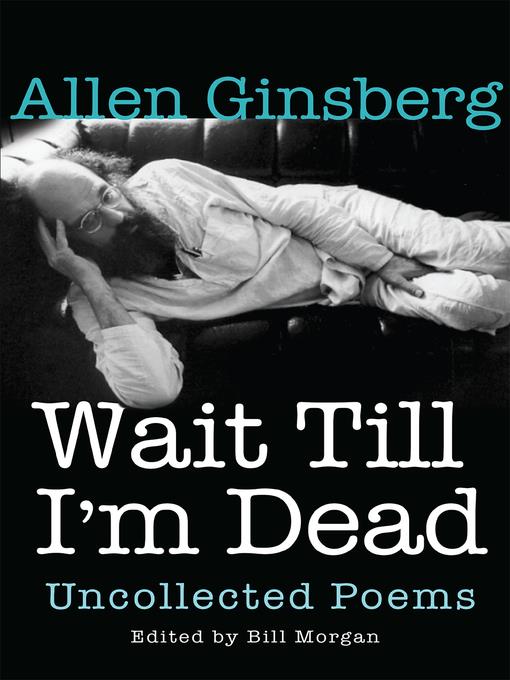
Wait Till I'm Dead
Uncollected Poems
کتاب های مرتبط
- اطلاعات
- نقد و بررسی
- دیدگاه کاربران
نقد و بررسی

February 15, 2016
Prolific Ginsberg editor Morgan reminds us that the quintessential Beat's collected poems constitute a volume of 1,200 pages. And here are 200 more pages of them, of which it must be said that the reason they haven't been collected before isn't low quality. Spanning Ginsberg's career from 1942 to 1996 and presented chronologically, they could, much more easily than that 1,200-page doorstop, be the ideal companion to a biography. Indeed, if the notes Morgan appends were more numerous and more thoroughgoing, the book could be read as a biography-in-vignettes. The remarkably few clunkers here crash, like most bad Ginsberg, not because their themes are obscure but because their material particularsthings and motionsare. Gross homosex and scatology are near-totally absent, so the ick factor is minimal. Delights include the opening set of quatrains slamming student Allen's congressman, a long ramble on America written during a cross-country flight in 1965, a final conversation with old friend Carl Solomon, and enough jokey or philosophical or contemplative or observational short poems to make those who've sworn off Ginsberg reconsider.(Reprinted with permission of Booklist, copyright 2016, American Library Association.)

Starred review from February 1, 2016
Much more than a footnote to 2006's massive Collected Poems, 1947-1997, this carefully chosen gathering of Ginsberg's fugitive pieces, some unpublished and others long buried in obscure magazines, spans his college days in the 1940s through 1996, the year before his death at age 70. For five decades Ginsberg adhered to a personal ars poetica ("I must write down/ every recurring thought --/ stop every beating second"), which for better or for worse influenced generations of poets beyond the Beats. An example of this spontaneous aesthetic at its liveliest is the heretofore uncollected "NY to San Fran," a 27-page Whitmanic reverie of hallucinogenic scope the poet set down in a notebook during a 1965 crosscountry flight. But Ginsberg could pivot when appropriate, as in the formal unpublished elegy to his father, the poet Louis Ginsberg, composed in 1976. VERDICT Together with the editor's informative notes, this volume not only complements its larger predecessor but similarly offers an impressionistic microhistory of the 20th-century American counterculture, its restless consciousness and broad emotional register filtered through the unbridled visions of one of its most outspoken icons. Ginsberg fans and scholars alike will appreciate the wealth of new material included. [See Prepub Alert 8/3/15.]--Fred Muratori, Cornell Univ. Lib., Ithaca, NY
Copyright 2016 Library Journal, LLC Used with permission.

September 1, 2015
"Rainy night on Union Square, full moon. Want more poems? Wait till I'm dead." So proclaimed Ginsberg at 3:30 in the morning on August 8, 1990. And now, nearly 20 years after his death, in the first Ginsberg book since Collected Poems was updated in 2006, here are more poems. Published in obscure journals or found in letters, the 103 chronologically arranged poems included here span Ginsberg's entire career, from the 1940s through the 1990s, and include notes from the poet himself.
Copyright 2015 Library Journal, LLC Used with permission.

February 1, 2016
Much more than a footnote to 2006's massive Collected Poems, 1947-1997, this carefully chosen gathering of Ginsberg's fugitive pieces, some unpublished and others long buried in obscure magazines, spans his college days in the 1940s through 1996, the year before his death at age 70. For five decades Ginsberg adhered to a personal ars poetica ("I must write down/ every recurring thought --/ stop every beating second"), which for better or for worse influenced generations of poets beyond the Beats. An example of this spontaneous aesthetic at its liveliest is the heretofore uncollected "NY to San Fran," a 27-page Whitmanic reverie of hallucinogenic scope the poet set down in a notebook during a 1965 crosscountry flight. But Ginsberg could pivot when appropriate, as in the formal unpublished elegy to his father, the poet Louis Ginsberg, composed in 1976. VERDICT Together with the editor's informative notes, this volume not only complements its larger predecessor but similarly offers an impressionistic microhistory of the 20th-century American counterculture, its restless consciousness and broad emotional register filtered through the unbridled visions of one of its most outspoken icons. Ginsberg fans and scholars alike will appreciate the wealth of new material included. [See Prepub Alert 8/3/15.]--Fred Muratori, Cornell Univ. Lib., Ithaca, NY
Copyright 2016 Library Journal, LLC Used with permission.

























دیدگاه کاربران